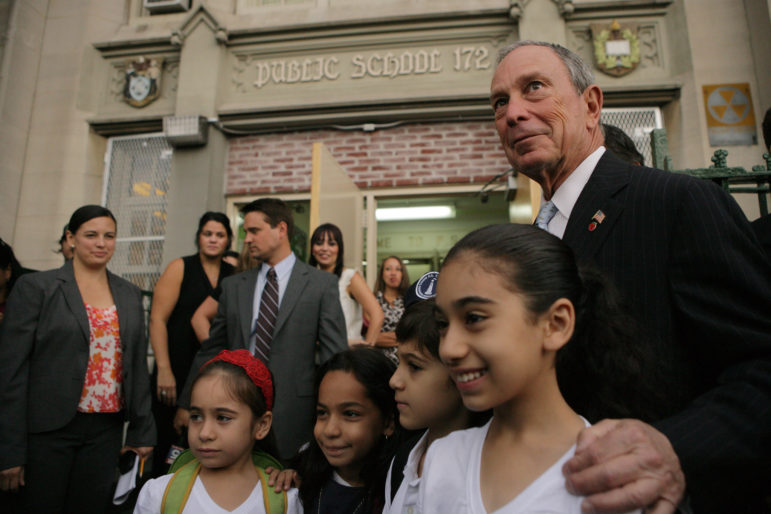State lawmakers on Friday held a hearing to consider whether to extend mayoral control of city schools for another three years. City Limits takes a look back at our early coverage of the 20-year-old policy, which was intended to provide a “a radical jolt” to faltering NYC public schools at the time, following in the foot steps of cities like Chicago and Boston.

NYC Mayor’s Office/Edward Reed
Mayor Mike Bloomberg greeting students on the first day of school in 2010.
Flashback Friday is a series highlighting stories from City Limits’ 45-year archive.
State lawmakers on Friday held a hearing to consider whether to extend mayoral control of city schools—established nearly two decades ago under then-Mayor Michael Bloomberg—for another three years. The current policy, which was last extended in 2019 and will expire this June, shifted decision-making and accountability for the city’s public school system from school boards and the Board of Education to the mayor and City Hall.
“New York’s faltering public schools need a radical jolt,” City Limits reported in January 2002, when mayoral control was one of several ideas being explored by a legislative task force and education stakeholders to turn the system around. At the time, several other cities had already made the switch:
In the 1990s, dropout and illiteracy rates grew to such embarrassing proportions in Chicago, Cleveland, Boston and smaller cities that their mayors wrested control from their school boards in a bid to save their cities’ reputations and their own political futures. Mayors won support from business leaders and state legislatures, if not from teachers and parents, by promising that tighter control of the system would improve educational outcomes for students.
—The Big Idea: Hizzoner Students, City Limits, January 2002
…
The biggest payoff, it turns out, is financial. By positioning schools as economic engines, mayoral control corrals business as a stakeholder in schools. Better students mean better prospective employees. And that keeps business—meaning jobs, consumers and votes—in town. Often mayors will shoulder the burden of increased accountability for school performance—meaning no more blame games with the Board of Education—because they gain greater access to both public and private financing.
“From Lindsay right through Giuliani, BOE’s independence has not helped it in the resource area,” says Noreen Connell, executive director of the Educational Priorities Panel.
…
If New York’s new mayor wants to head a drive for higher math and reading scores, he will have to meet an unspoken and perhaps unfair expectation to reform all of the system simultaneously, not sequentially. Can one person jumpstart all that-and run a city at the same time?
Assemblymember Steven Sanders, whose committee will be key in deciding whether New York City gets to try this experiment, doesn’t think so. “A unilateral decision maker is inconsistent with the reality of multiple stakeholders who need to be involved in public education,” Sanders says.
You can read that full story in our archives here, or in the PDF of the print magazine below.
As in years past, City Limits will be covering this year’s debate over mayoral control, and we want to know what our readers think, particularly those who work or have children in the city’s school system. If you have an opinion, share it here, or send an email to Jeanmarie@citylimits.org.








